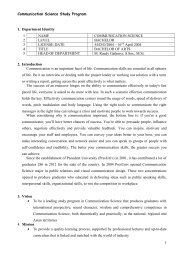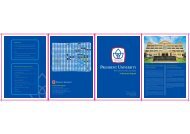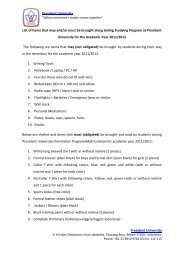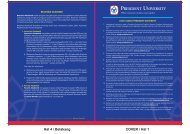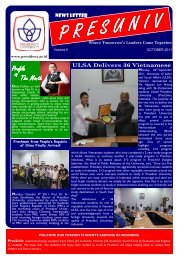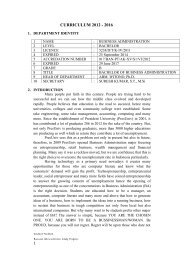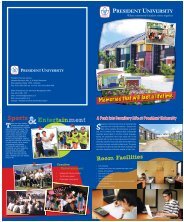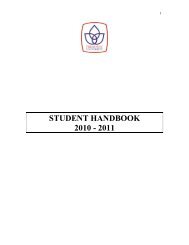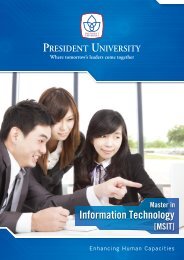Curriculum - President University
Curriculum - President University
Curriculum - President University
Create successful ePaper yourself
Turn your PDF publications into a flip-book with our unique Google optimized e-Paper software.
The students are taught to prepare and present a business plan that consists of market and<br />
marketing, operational, organizational and human resource, legal and financial aspects<br />
2. MANAGERIAL ACCOUNTING<br />
This course is concerned with the provisions and use of accounting information to managers<br />
within organizations, to provide them with the basis to make informed business decisions that will<br />
allow them to be better equipped in their management and control functions. It is the process of<br />
identification, measurement, accumulation, analysis, preparation, interpretation and<br />
communication of information used by management to plan, evaluate and control within an<br />
entity and to assure appropriate use of and accountability for its resources.<br />
3. MANAGERIAL ECONOMICS<br />
is a branch of economics that applies analysis to decision methods of businesses or other<br />
management units. As such, it bridges economic theory and economics in practice. If there is a<br />
unifying theme that runs through most of managerial economics it is the attempt to optimize<br />
business decisions given the firm's objectives and given constraints imposed by scarcity,<br />
4. INTERNATIONAL MANAGEMENT<br />
A manager in a diverse organization must learn to embrace differences in employees’ gender, race,<br />
sexuality, age, and religion. Students’ complex issues of managing a diverse workforce as well as<br />
prepare them to enter an increasingly board workplace where diversity must only not be accepted,<br />
but also understood. The materials and discussion are taken to international level.<br />
5. INTERPERSONAL SKILLS<br />
This course introduces students to the dynamics and characteristics of interpersonal<br />
communication. Students will explore their own communication practices and improve their skills in<br />
verbal and nonverbal communication, perception and active listening. They will assess and interpret<br />
client needs, learn strategies for resolving conflict and participate as team members.<br />
6. MANAGEMENT INFORMATION SYSTEM (MIS)<br />
This course is designed to help students learn how to manage and use information technologies to<br />
revitalize business processes, improve business decision making and competitive advantage.<br />
7. ORGANIZATION BEHAVIOR<br />
This course presents the study of factors that either influence or are influenced by people at work.<br />
Focuses on macro factors such as organizational structure, technology and environment; group<br />
factors such as group dynamics, leadership, conflict, change and decision making; and individual<br />
factors such as personality, attitudes, perception, motivation, and job satisfaction.<br />
8. FINANCIAL STATEMENT ANALYSIS<br />
Every management student should be able to know the condition and performance of an<br />
organization through financial statement analysis (or financial analysis), which is the process of<br />
understanding the risk and profitability of an organization through analysis of reported financial<br />
information, particularly annual and quarterly reports. Financial analysis is the selection, evaluation,<br />
and interpretation of financial data, along with other pertinent information, to assist in investment<br />
and financial decision-making. Financial analysis may be used internally to evaluate issues such as<br />
15



